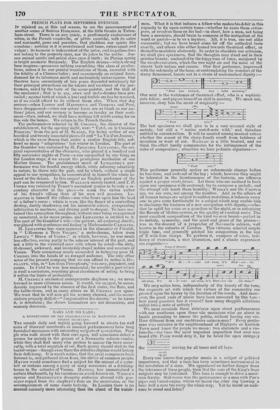EARS AND NO EARS;
A DISSERTATION ON TRE PERFORMANCES OF WATCHMEN AND STREET MUSICIANS.
THE sounds daily and nightly going forward in streets (as well cries of itinerant merchants as musical performances) have long furnished musicians with interesting subjects of speculation. Peo- ple who walk about with their ears open, will sometimes detect a genius for melody in the person of a Newcastle salmon-vender, while they shall find many who profess to amuse the town musi- cally, with a total negation of car. Such gentry should stick to the barrel-organ—though even there the defective rhythm would betray their deficiency. It is worth notice, that the great composers have listened to, and gathered ideas from, the ditties of common people. HA.YDN would sometimes find a subject for the minuet of a quar- tett or sinfonia among a party of noisy carousers at a drinking- house in the suburbs of Vienna. HANDEL has immortalized a certain blacksmith, by his variations on a well-known air. WEBER's operas and BEETHOVEN'S dramatic sinfonias abound with pas- sages copied from the shepherd's flute on the mountains, or the accompaniment of some rustic festivity. In London there is no musical curiosity more interesting than the chant of the watch- men. What it is that induces a fellow who makes his debt in this capacity to fix upon certain tones—whether he roars them extem- pore, or revolves them on his bed—in short, how a man, not being born a musician, should begin to compose at the instigation of the ward or parish—is to us a mystery. All, it is true, are not alike successful ; but we have heard some hit off the cathedral taste exactly, and others who either leaned towards theatrical effect, or desired to modulate abstrusely. In order to elucidate our criticism, we shall give specimens, that the thoughts may stand out in their pristine beauty, unclouded by the foggy tone of voice, uninjured by the rough execution, which the raw night air and the noise of the streets both induce and excuse. Our first performer, impressed with the solemnity of the hour, or contemplating the wonders of the starry firmament, bursts out in a strain of ecclesiastical dignity :—
Our next is the watchman of theatrical effect, who is a sophisti- cate fellow, and piques himself on skill in pausing. We must not, however, deny him the merit of originality :—
The last specimen we shall give is in a very unusual style of melody, but still a " native watch-note wild," and therefore entitled to consideration. It will be mooted among musical critics whether the ascent of the sharp fourth result from boldness of invention or want of ear. RAMEAU is a little bruised, and we think the effect hardly compensates for the infringement of the rules of composition ; otherwise we hate pedantic objections
This performer generally makes an enharmonic change before he has done, and ends out of the key ; which, however they might be tolerated in the licentiousness of the fantasia, are offences
against a proper canto ferino. Let those who are inclined to look upon our specimens with contempt, try to compose a melody, and the attempt will teach them humility; WESLEY and Dr. CROTCH are, we are sure, not among the number. And as the affairs of all human beings are subject to sudden mutations, it behoves every one to give some forethought to a subject which may enable him to discharge the business of a new occupation with dignity,—whe- ther he uplift his voice as a guardian of the night, or in eulogizing the flavour of Melton oysters, or the quality of esculent roots. The most excellent composition of the kind we ever heard—perfect in its melody, symmetry, and the spirit and grace of the phrase— was in the descant of h. proprietor of Newcastle salmon, well known in the suburbs of London. This virtuoso selected simple triple time, and generally pitched his composition in the key of E with four sharps. To perform it, compass of voice, bril- liancy of execution, a nice intonation, and a chaste expression are requisite:—
We may nofce here, independently of the beauty of the tune, the exquisite art with which the virtues of the commodity are pressed upon the hearer by the iteration of the words. And more- over, the great ends of music have been answered by this tune : how many passions has it roused! how many sluggish affections called into a state of activity ! We must conclude these strictures upon street performances with our anathema upon those vile musicians who go about in bands pretending to amuse the public, without having any ear. How different from our unobtrusive salmon-man! Every gentle- man who estivates in the neighbourhood of Highgate or Kentish Town must know the people we mean : two clarionets and a vio- loncello—the bass the most impudent imposition that ever was heard (Dr. PARR would deny it, for he loved the open strings ;) the serving for all tunes and all keys.
Every one knows that popular music is a subject of political importance, and that a tune has been sometimes instrumental in the revolution of a state. We apprehend no further danger from the tolerance of these people, than that the ears of the King's liege subjects may be brutalized. This bass is enough to drive a musi- cian frantic. Still worse was the performance of a man with Pan's pipes and barrel-organ, whom we heard the other day blowing a tune half a note too sharp the whole way. Yet he found an audi- ence to stand and listen


















 Previous page
Previous page